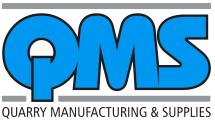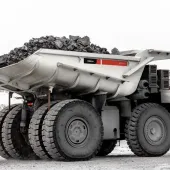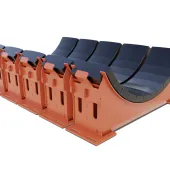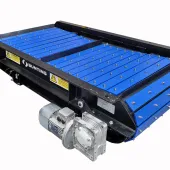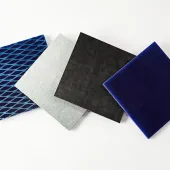Kingfisher Industrial abrasion-resistant solutions for bulk solids handling equipment
Wear-resistant linings improve productivity and reduce costs in dry bulk solids equipment
Wear-resistant lining specialists Kingfisher Industrial explain how they have sustained their competitiveness within the dry bulk cargo handling market. By successfully carrying out projects within the UK and overseas they continue to be at the forefront providing turnkey packages for process plants and process equipment.
John Connolly, managing director, commented: ‘At Kingfisher we carry out a number of activities that help us gain that competitive advantage within the market place. By using our own skilled engineering project management and site-based operatives we can undertake a vast majority of engineering, design, manufacture and online installation. With the integration of both manufacturing processes and operational activities we have made continuous investments in new design software and CNC manufacturing machinery, thus reducing the risk of non-conformance through protracted supply chain and eliminating the costs of third-party overheads and margins.’
The economic benefits of using wear-resistant linings were proven recently at a major coal import facility within the UK that supplies various power stations with their bulk material. Kingfisher's commercial and exports sales manager commented: ‘We were assigned the project to reline two ship unloaders on the plant, due to the high levels of abrasion and wear caused when handling coal.’ Kingfisher recommended lining both unloaders with a combination of our K-PLAS polymer and K-CLAD metallic lining systems.
Many power stations are converting from coal to the use of biomass material. Due to the high abrasive nature of these materials, incorporating a wear-resistant lining system within the plants process equipment is a suitable solution. Kingfisher have been working with a number of power plants converting from coal to biomass, to name a recent project that was carried out towards the end of 2012 the important part of this project was to design, manufacture and install spiral chutes to transfer wood pellets into the storage/feed bunkers. The design brief for Kingfisher Industrial was to provide a continuous, uninterrupted flow of wood pellet biomass without causing any material degradation to the process itself. The complete project was contracted to Kingfisher Industrial, whose experience in bulk material handling solutions enabled them to deliver the final solution, from design to installation within five months.
Kingfisher’s overseas presence has increased over the last couple of years; recently they were approached through an overseas agent to provide a solution for a coal terminal in the Asian pacific. The project involved the replacement of coal transfer chutes, the chute structure had been compromised due to the abrasive nature of the material conveyed, due to the existing chute design they were experiencing continual blockages when handling coal imported from Indonesia that has a natural high-moisture content. With no consistent material flow this caused misaligned material discharge affecting belt tracking and the life of the conveyor belt.
The solutions offered by Kingfisher were to re-design the conveyor chutes. This process incorporated enhanced structural geometry providing a consistent flow of material through the chute preventing blockages and provided central discharge onto the receiving conveyor belt. By installing a combination of wear-resistant and low-friction lining materials this ensured service longevity and operational availability.
Following installation and commissioning the benefits were immediately recognized. A reduction in demurrage costs, reduced maintenance costs and eliminated operational downtime as the requirement to unlock the chutes were significantly reduced.
Referring back to dry bulk solids another popular mineral that is also considered highly abrasive is potash, a combination of various mined and manufactured salts that contain potassium. A project carried out in 2012 involved a large bulk cargo handler who currently delivers 500,000 tonnes of potash by sea; the port also handles third-party cargo including 250,000 tons of export grain and bulk minerals. Due to successful past projects carried out at the plant, Kingfisher were awarded the full turnkey project to redesign, manufacture and install another conveyor chute.
Kingfisher are able to demonstrate the different types of lining solutions available throughout the process of handling coal within a bulk terminal. Starting when the coal arrives at port they have developed various lining solutions protecting and enhancing the performance of the reception hoppers, the conveyor system, stacker reclaimers through to the rail loading facility. Throughout the process, equipment is subjected to impact, friction and sliding induced abrasion. By installing a combination of K-ALOX, K-BAS, K-ZAS and K-CLAD materials this takes into account the differing levels of wear at various points in the transfer chutes. The linings are supplied in various thicknesses, offering guaranteed long-term protection of up to 10-12 years against perforation of the fabrication.


